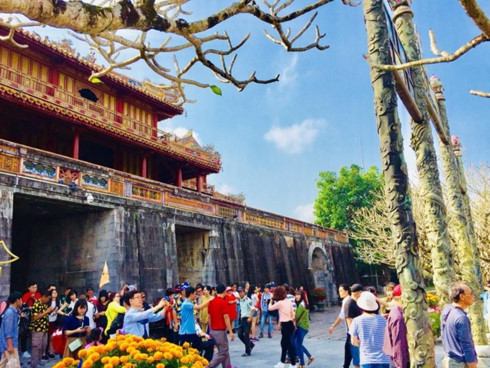
The Hue ancient capital city in the central province of Thua Thien-Hue served more than 67,870 tourists, including 48,180 foreigners during Tet (Lunar New Year) holiday from February 2-8, up 177 percent year on year.
The Hue ancient capital city in the central province of Thua Thien-Hue served more than 67,870 tourists, including 48,180 foreigners during Tet (Lunar New Year) holiday from February 2-8, up 177 percent year on year.
 |
| Visitors in Hue city (Source: tintucvietnam.vn) |
The provincial Department of Tourism expected 230,000 tourists, including about 70,800 foreigners, to visit Hue from January 31 to February 11, up 5 percent compared to the same period last year.The province’s total tourism revenue is estimated at 140 billion VND (6.02 million USD).
During the first three days of the 2019 Lunar New Year (February 5-7), the Hue ancient citadel relic complex – a UNESCO World Cultural Heritage site – was open with free admission for domestic visitors.
Holidaymakers to the Hue ancient capital city on those days had a chance to participate in royal games and enjoy calligraphy and martial arts performances, along with traditional dragon and lion dances.
As part of activities welcoming the arrival of Tet, the biggest and most important festival year-round in Vietnam, the Hue Monuments Conservation Centre re-enacted the Neu tree planting ceremony, a traditional ritual practised under the Nguyen Dynasty (1802-1945) on January 28 (the 23rd day of the last lunar month).
There was also an array of activities such as wrapping chung cake (a traditional Tet novelty cake made from glutinous rice).
In 2018, the Hue Monuments Conservation Centre earned 381.7 billion VND (16.4 million USD) from serving over 3.5 million tourists, up 19 percent compared to the target set.
The centre has implemented 24 restoration projects with total investment exceeding 278.8 billion VND (11.9 million USD).
Hue, the formal imperial capital of Vietnam for hundreds of years, is home to five heritages recognised by UNESCO, including the ancient citadel relic complex (a World Cultural Heritage site), Hue royal court music (an intangible cultural heritage item), Nguyen Dynasty’s wood blocks (a documentary heritage item), Nguyen Dynasty’s royal administrative documents (part of the Asia-Pacific Register of UNESCO’s Memory of the World Programme), and literature on Hue royal architecture (another documentary heritage).
The Hue imperial citadel relic site has been ranked second among the top seven tourist attractions of Vietnam in 2017.





![[Photo series] Admiring the most beautiful riverside road in Dong Nai before its technical traffic opening](/file/e7837c02876411cd0187645a2551379f/012026/nen_20260114174655.jpg?width=500&height=-&type=resize)